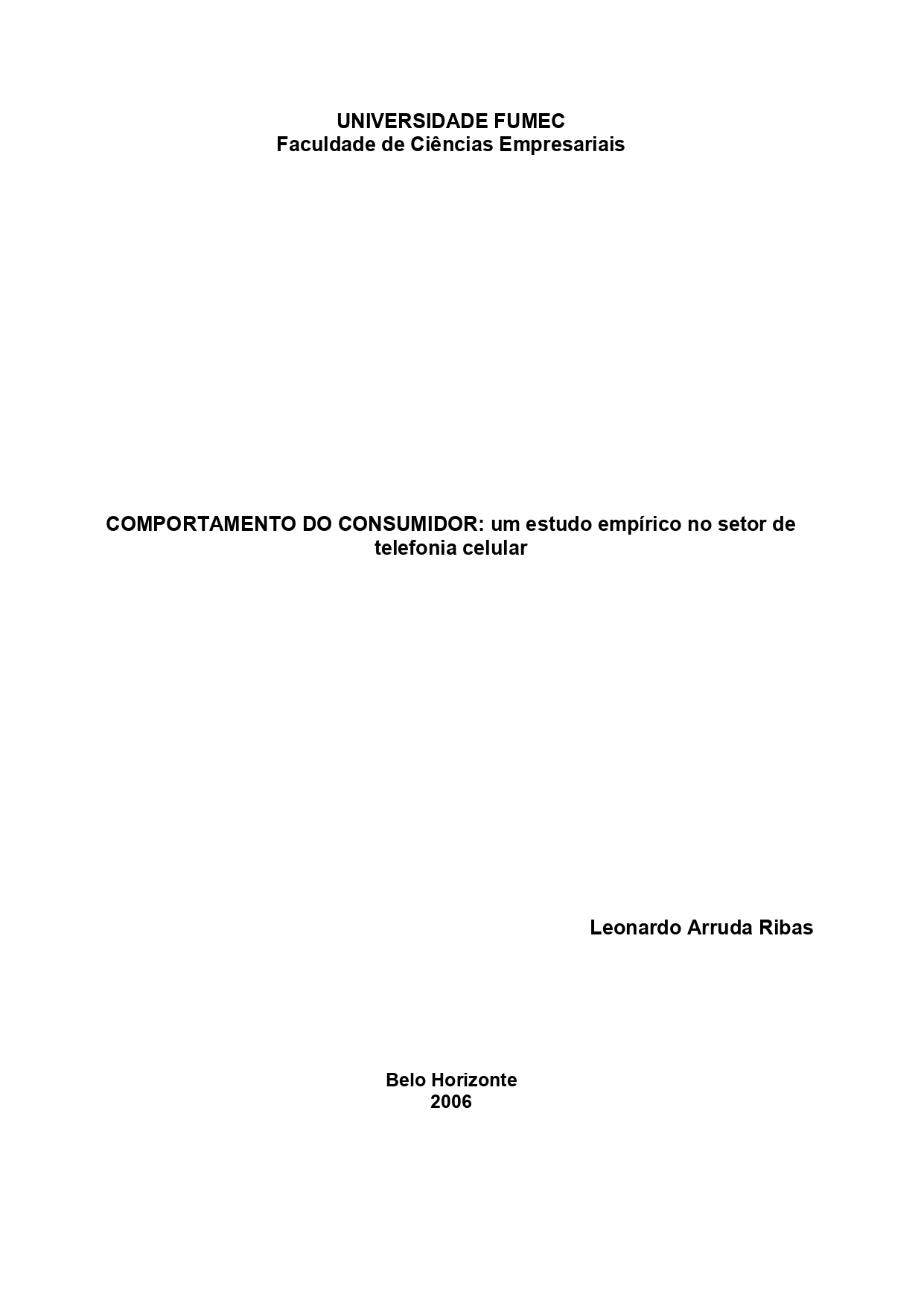Comportamento do consumidor: um estudo empírico no setor de telefonia celular

Visualizar/
Data
2006Autor
Ribas, Leonardo Arruda
xmlui.mirage2.itemSummaryView.MetaData
Mostrar registro completoResumo
Este trabalho foi desenvolvido com o objetivo de conhecer o comportamento de compra
dos consumidores de serviço de telefonia celular (modalidade pré-pago e pós-pago),
com ênfase na etapa de avaliação de alternativas, bem como analisar a imagem que os
consumidores têm das operadoras de telefonia celular. Para tal, foram realizados dois
levantamentos do tipo survey. O primeiro teve o objetivo de refinar a escala de
alternativas de compra de serviço de telefonia celular, identificando os principais
atributos levados em consideração pelos consumidores desse serviço; o segundo teve
o objetivo de conhecer o comportamento do consumidor em relação às operadoras
atuantes no mercado. Os levantamentos foram de natureza descritiva com base em
corte transversal, com variáveis quantitativas, totalizando 512 entrevistas pessoais
realizadas nas regiões de maior fluxo em Belo Horizonte, Minas Gerais. Foram
utilizados questionários estruturados apenas com questões fechadas.
Os atributos considerados mais importantes na avaliação de alternativa de compra de
serviço de telefonia celular são: cobertura, qualidade das ligações, atendimento e valor
de tarifas (preço) baixo, nessa ordem. Não foram encontradas diferenças
estatisticamente significativas entre o nível de importância atribuído aos fatores
considerados pelos clientes, de acordo com as operadoras de telefonia celular com as
quais operam. Além disso, verificou–se que a imagem que os consumidores têm das
operadoras difere em todos os atributos avaliados.
Foi identificada a importância das organizações trabalharem a relação entre o Brand
Equity e a intenção de compra dos consumidores, já que essa relação é relativamente
alta, sugerindo que a empresa desenvolva produtos/serviços com o objetivo de
agregar valor à marca, tendo como foco principal os construtos funcionais (cobertura e
qualidade das ligações).
A satisfação demonstrou ser um forte influenciador da lealdade, recomendação e
propaganda boca a boca trazendo à tona a importância das empresas/organizações
trabalharem (mensurar, analisar e gerenciar) esses construtos. Sugere-se, portanto,
que o corpo gerencial da empresa/organização trabalhe a satisfação, com o objetivo de
fidelizar seus clientes levando-os a recomendar o serviço bem como fazer propaganda
direta aos grupos que mantêm relacionamento.
Assim, conclui-se que este trabalho oferece contribuição para a sistematização e
organização do conhecimento nas áreas do comportamento do consumidor e de
marcas, bem como contribui para a tomada de decisões na área gerencial do setor de
telefonia celular. This paper has been developed with the aim of getting to know the purchase behavior
of cellular telephony service consumers (both prepaid and postpaid services), with an
emphasis on the alternative evaluation behavior. It also aims at analyzing the image
consumers have of cellular telephony operators. In order to reach those goals, two
surveys have been conducted. The first aimed at refining the range of alternatives in the
purchase of cellular telephony service, by identifying the main attributes taken into
account by the consumers of this service; the second aimed at knowing the behavior of
the consumer in relation to the operators active in the market. The surveys had a
descriptive nature based on a transversal cross-section, with quantitative variables,
totaling 512 personal interviews carried out in the highest flow density areas of Belo
Horizonte, Minas Gerais. Closed-question structure questionnaires were the ones used.
The attributes considered to be the most important in the alternative evaluation of
cellular telephony purchase are: coverage area, call quality, customer care and low
tariffing, in this order. Statistically significant differences were not found among the
importance levels attributed to the factors considered by the customers, as far as
cellular telephony operators used are concerned. Besides that, it was clear that the
image the consumers have of the operators differ in all the attributes evaluated.
The importance for the operators to take into account the relationship between Brand
Equity and the purchase intention of the consumers was identified, as this relationship is
relatively high, suggesting the company develop products and services aiming at adding
value to the brand and focusing mainly on the functional constructs (coverage area and
call quality).
Customer satisfaction showed to be a strong influence on customer loyalty.
Recommendation and one-to-one advertising surfaced the importance for the
companies to work on (measure, analyze and manage) these constructs. Thus, it is
suggested that the company’s management focus on customer satisfaction in order to
raise customer loyalty levels, which will drive customers not only to recommend the
company’s service but also to directly advertise it to their closer relationship groups.
Therefore, this paper not only offers a contribution towards the systematization and
organization of the knowledge in the areas of customer behavior and brands, but it
contributes for the decision-taking process in cellular telephony management as well.
